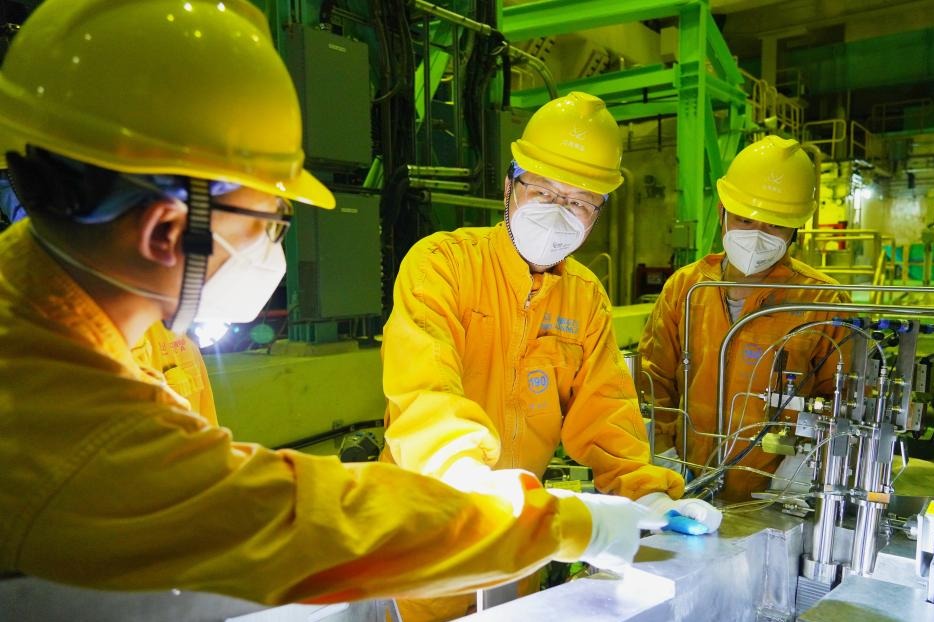China still puts people's lives first amid virus policy shift


China's National Health Commission issued optimized COVID-19 control regulations on Dec 7, including a loosening of lockdowns and the elimination of a requirement that a recent negative COVID-19 test be shown to enter most public places. This is the most significant measure taken by the Chinese government since the start of the COVID-19 pandemic.
Many Western media outlets have criticized the country's zeal in controlling the spread of the coronavirus, as what interests Western countries is not the health of the Chinese people but the enormous opportunities for profit in the world's second-largest economy. There was a certain anxiety in Western countries about the strict prevention and control measures and they have impatiently awaited the return of normal economic operations in China for the resumption of their business activities. In this logic, money comes first, then people's lives.
Despite the criticism and the economic impact, the dynamic zero-COVID policy adopted by the Chinese government successfully contained the spread of the novel coronavirus in the country. Data on the pandemic show that prior to the easing of the prevention and control measures, 360,734 people had been infected in the country and 4,681 people had died from the disease. In relative terms, China has had 249 cases per million people and only four casualties. By the same criteria, India, the second most populous country in the world, had 31,761 infections per million and 377 deaths. The third most populous country in the world, the United States, has had the most cases and deaths, with 101,263,635 and 1,109,725, respectively, which means, in relative terms, 302,455 cases and 3,315 deaths per million.
We must evaluate China's success in fighting the coronavirus through a counterfactual approach. If its infection and death rates were similar to that of the US, China would have 423,437,000 people infected and 4,641,000 deaths. This did not occur because the government and society paid a high cost in mass testing, vaccination, the development of data systems to focus on the emergence of the virus' new transmission chains, and, above all, the cooperation of the population and social organizations that helped to face the most challenging days of quarantine.
Analyzing the world data on COVID-19, it is noteworthy that among the 70 countries with the highest mortality rates, only three are not from Europe or the Americas: Tunisia (40th), South Africa (66th), and Iran (67th). It is worth asking why this happened. We don't have answers, but we can ask some questions to help understand this phenomenon. Does this relate to the political system of competition between political parties? Does this link to a highly selfish, consumerist and individualistic culture? Does this connect to value systems that emphasize the individual more than the community?
In this regard, where the value systems of each society influenced the response to the pandemic, I can share the experience of the pandemic in Brazil as a way of comparing it with the approach of the Chinese government. While the Chinese government organized society to face the challenge of the novel coronavirus, built emergency hospitals in record time, shared the genetic sequence of the virus with the world, supported the development of vaccines, and used artificial intelligence systems to monitor the emergence of new infections, in short, seeking to protect the lives of its citizens, the government of President Jair Bolsonaro did just the opposite.
At the beginning of the pandemic, Bolsonaro downplayed the seriousness of the problem, stating that the novel coronavirus would be a "little flu". He later urged people to get infected so the country could quickly achieve "herd immunity". He did not coordinate prevention actions nationally and discredited the work of scientists. He also delayed the purchase of vaccines and sought to block the agreement made by the Chinese vaccine maker Sinovac and Sao Paulo-based Butantan Institute. Bolsonaro's incompetence cost nearly 700,000 lives.
Returning to the Chinese dynamic zero-COVID policy, it is essential to highlight the success achieved by the approach and recognize the sacrifices the Chinese people made when collaborating with the health authorities and following the stipulated rules. However, circumstances change, and because of that, it is necessary to adapt to the new reality.
Three years ago, there was little knowledge about the disease. There were no treatment protocols. There were still no vaccines or drugs that could help in the recovery of patients. Currently, there is more knowledge about the virus, but there is also the emergence of new strains of the virus. It is precisely this new reality that allows for the updating of the policy to combat COVID-19, as we know that dialectically, the success of a strategy brings new problems that require new solutions, as in the case of the contradictions that arise from the current successful policy to combat the pandemic and the new challenges that have arisen.
Finally, it is necessary to emphasize that the risk persists. It is worth noting that the world's daily average of new cases in the last week was 467,000, and the average of deaths was 1,400 people. Despite changes in approach, the focus should still be on putting people's lives first.
The author, a professor of international political economy at Sao Paulo State University, contributed this article to China Watch, a think tank powered by China Daily.
- China rolls out nationwide reform to allow shared access to employee health insurance accounts
- China launches first Type 076 amphibious assault ship
- Chinese scientists assemble chromosome-level genome of critically-endangered fish from Yangtze
- AI study rooms transform learning, raising concerns
- Top court puts juvenile protection on high priority
- Outreach offices give people a say in nation-building process




































